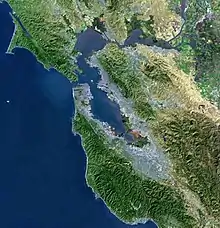Santa Clara, California
Santa Clara (/ˌsæntəˈklærə/; Spanish for "Saint Clare")[7] is a city in Santa Clara County, California. The city's population was 127,647 as of the 2020 United States Census, making it the eighth-most populous city in the Bay Area. Located in the southern Bay Area, the city was founded by the Spanish in 1777 with the establishment of Mission Santa Clara de Asís under the leadership of Junípero Serra.
Santa Clara, California | |
|---|---|
| City of Santa Clara | |
_(cropped).jpg.webp)  .jpg.webp) _(cropped).jpg.webp) .jpg.webp) Clockwise: Mission Santa Clara de Asís; the Carmelite Monastery; Saint Claire Monument; Santa Clara University; Women's Club Adobe | |
 Flag 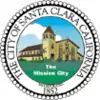 Seal | |
| Nickname: The Mission City | |
 Location in Santa Clara County and the U.S. state of California | |
 Santa Clara Location in the United States  Santa Clara Santa Clara (the United States) | |
| Coordinates: 37°21′16″N 121°58′9″W | |
| Country | United States |
| State | California |
| County | Santa Clara |
| Incorporated | July 5, 1852[1] |
| Named for | Saint Clare of Assisi |
| Government | |
| • Type | Council/Manager[2] |
| • Mayor | Lisa Gillmor[3] |
| Area | |
| • Total | 18.28 sq mi (47.34 km2) |
| • Land | 18.28 sq mi (47.34 km2) |
| Elevation | 72 ft (22 m) |
| Population (2020)[6] | |
| • Total | 127,647 |
| • Rank | 46th in California |
| • Density | 6,982/sq mi (2,697/km2) |
| Time zone | UTC−8 (Pacific) |
| • Summer (DST) | UTC−7 (PDT) |
| ZIP codes | 95050, 95051, 95054 |
| Area codes | 408/669 |
| FIPS code | 06-69084 |
| GNIS feature IDs | 1654953, 2411816 |
| Website | santaclaraca |
Santa Clara is located in the center of Silicon Valley and is home to the headquarters of companies such as Intel, Advanced Micro Devices, and Nvidia. It is also home to Santa Clara University, the oldest university in California,[8] and Levi's Stadium, the home of the National Football League's San Francisco 49ers, and Cedar Fair's California's Great America Park. Santa Clara is bordered by San Jose on all sides, except for Sunnyvale and Cupertino to the west.
History
.jpg.webp)
.jpg.webp)
The Tamien tribe of the Ohlone nation of Indigenous Californians have inhabited the area for thousands of years.
Spanish period
The first European to visit the valley was José Francisco Ortega in 1769. The Spanish began to colonize California with 21 missions and the Mission Santa Clara de Asis was founded in 1777.
Mexican period
The Battle of Santa Clara, one of the last battles of the Conquest of California, was fought between a contingent of Californios, led by Francisco Sánchez, against the invading American forces.
American period
.jpg.webp)
.png.webp)
In 1851, Santa Clara College was established on the grounds of the original Mission. In 1852, Santa Clara was incorporated as a town; it became state-chartered by 1862.
For the next century, the economy centered on agriculture since orchards and vegetables were thriving in the fertile soil. By the beginning of the 20th century, the population had reached 5,000 and stayed about the same for many years.
In 1905, the first public high-altitude flights by humans were made over Santa Clara in gliders designed by John J. Montgomery. The semiconductor industry, which sprouted around 1960, changed the city and surrounding Valley of Heart's Delight; little of its agricultural past remains.
Santa Clara's first medical hospital was built in 1963. This structure, on Kiely Boulevard, was replaced in 2007 with a new Kaiser Permanente medical center located on Lawrence Expressway at Homestead Road.
Santa Clara was also home to a major mental health facility, Agnews State Hospital. According to the National Park Service, more than 100 persons were killed at this site in the 1906 earthquake. The site is the former home to Sun Microsystems and is listed in the National Register of Historic Places.
In 1963, Santa Clara City Council voted to knock down the eight-block grid of Downtown Santa Clara, in order to receive federal funding for urban renewal.[9][10] Since 2017, there has been a grassroots movement to rebuild Santa Clara's historic downtown.[11]
Geography
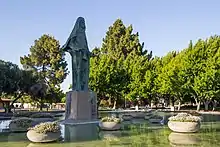
Santa Clara is drained by three seasonal creeks, all of which empty into the southern portion of San Francisco Bay; these creeks are San Tomas Aquino Creek, Saratoga Creek, and Calabazas Creek.
There are some significant biological resources within the city including habitat for the burrowing owl, a species of special concern in California due to reduction in habitat from urban development during the latter 20th century.[12] This owl uses burrows created by ground squirrels and prefers generally level grasslands and even disturbed areas. Coyotes have also become active in the area in recent years.[13]
According to the United States Census Bureau, the city covers an area of 18.4 square miles (48 km2), all of it land.
Climate
The average daily temperatures in July range from 82 °F (28 °C) to 53 °F (12 °C). Winters are mild, with the mean daily temperatures in January ranging from 58 °F (14 °C) to 38 °F (3 °C). Most of the annual rainfall comes in the winter months; the summer months are generally rainless.
| Climate data for Santa Clara, California (Santa Clara University, 1893–1976) | |||||||||||||
|---|---|---|---|---|---|---|---|---|---|---|---|---|---|
| Month | Jan | Feb | Mar | Apr | May | Jun | Jul | Aug | Sep | Oct | Nov | Dec | Year |
| Average high °F (°C) | 58 (14) |
62 (17) |
66 (19) |
70 (21) |
74 (23) |
79 (26) |
82 (28) |
82 (28) |
81 (27) |
76 (24) |
67 (19) |
59 (15) |
71 (22) |
| Average low °F (°C) | 38 (3) |
41 (5) |
42 (6) |
44 (7) |
47 (8) |
50 (10) |
53 (12) |
52 (11) |
51 (11) |
47 (8) |
42 (6) |
39 (4) |
46 (8) |
| Average precipitation inches (mm) | 3.03 (77) |
2.56 (65) |
2.30 (58) |
1.03 (26) |
.40 (10) |
.09 (2.3) |
.01 (0.25) |
.04 (1.0) |
.27 (6.9) |
.63 (16) |
1.47 (37) |
2.66 (68) |
14.49 (367.45) |
| Average precipitation days (≥ .01 in) | 10 | 9 | 9 | 5 | 3 | 1 | 0 | 0 | 1 | 3 | 6 | 9 | 56 |
| Source: Western Regional Climate Center[14] | |||||||||||||
Demographics
| Historical population | |||
|---|---|---|---|
| Census | Pop. | %± | |
| 1880 | 2,416 | — | |
| 1890 | 2,891 | 19.7% | |
| 1900 | 3,650 | 26.3% | |
| 1910 | 4,348 | 19.1% | |
| 1920 | 5,220 | 20.1% | |
| 1930 | 6,302 | 20.7% | |
| 1940 | 6,650 | 5.5% | |
| 1950 | 11,702 | 76.0% | |
| 1960 | 58,880 | 403.2% | |
| 1970 | 86,118 | 46.3% | |
| 1980 | 87,700 | 1.8% | |
| 1990 | 93,613 | 6.7% | |
| 2000 | 102,361 | 9.3% | |
| 2010 | 116,468 | 13.8% | |
| 2020 | 127,647 | 9.6% | |
| U.S. Decennial Census[15] | |||
2010
.jpg.webp)
The 2010 United States Census[16] reported that Santa Clara had a population of 116,468. The population density was 6,327.3 inhabitants per square mile (2,443.0/km2). The ethnic makeup of Santa Clara was 52,359 (45.0%) White, 3,154 (2.7%) African American, 579 (0.5%) Native American, 43,889 (37.7%) Asian (13.6% Indian, 6.9% Chinese, 6.2% Filipino, 3.9% Vietnamese, 3.0% Korean, 1.5% Japanese), 651 (0.6%) Pacific Islander, 9,624 (8.3%) from other races, and 6,212 (5.3%) from two or more races. There were 22,598 people (19.4%) who identified as Hispanic or Latino; 14.6% of Santa Clara's population was of Mexican ancestry.
The Census reported that 113,272 people (97.3% of the population) lived in households, 2,860 (2.5%) lived in non-institutionalized group quarters, and 336 (0.3%) were institutionalized.
There were 43,021 households, out of which 14,477 (33.7%) had children under the age of 18 living in them, 21,817 (50.7%) were opposite-sex married couples living together, 4,081 (9.5%) had a female householder with no husband present, 2,038 (4.7%) had a male householder with no wife present. There were 2,146 (5.0%) unmarried opposite-sex partnerships, and 312 (0.7%) same-sex married couples or partnerships. 10,906 households (25.4%) were made up of individuals, and 2,945 (6.8%) had someone living alone who was 65 years of age or older. The average household size was 2.63. There were 27,936 families (64.9% of all households); the average family size was 3.18.
The age distribution of the population was as follows: 24,774 people (21.3%) were under the age of 18, 12,511 people (10.7%) aged 18 to 24, 41,876 people (36.0%) aged 25 to 44, 25,628 people (22.0%) aged 45 to 64, and 11,679 people (10.0%) who were 65 years of age or older. The median age was 34.1 years. For every 100 females, there were 102.0 males. For every 100 females age 18 and over, there were 100.9 males.
There were 45,147 housing units at an average density of 2,452.7 per square mile (947.0/km2), of which 19,747 (45.9%) were owner-occupied, and 23,274 (54.1%) were occupied by renters. The homeowner vacancy rate was 1.3%; the rental vacancy rate was 4.6%. 53,694 people (46.1% of the population) lived in owner-occupied housing units and 59,578 people (51.2%) lived in rental housing units.
2000

.jpg.webp)
As of the census[17] of 2000, there were 102,361 people, 38,526 households, and 24,117 families residing in the city. The population density was 2,149.1/km2 (5,566.2/mi2). There were 39,630 housing units at an average density of 832.0/km2 (2,155.0/mi2). The ethnic makeup of the city was 55.59% White, 2.29% African American, 0.53% Native American, 29.27% Asian, 0.43% Pacific Islander, 6.94% from other races, and 4.95% from two or more races. 15.99% of the population were Hispanic or Latino of any race.
There were 38,526 households, out of which 27.4% had children under the age of 18 living with them, 48.4% were married couples living together, 9.5% had a female householder with no husband present, and 37.4% were non-families. 25.9% of all households were made up of individuals, and 6.8% had someone living alone who was 65 years of age or older. The average household size was 2.58 and the average family size was 3.14.
In the city, the age distribution of the population showed 19.9% under the age of 18, 11.3% from 18 to 24, 39.1% from 25 to 44, 19.1% from 45 to 64, and 10.6% who were 65 years of age or older. The median age was 33 years. For every 100 females, there were 103.6 males. For every 100 females age 18 and over, there were 102.9 males.
According to a 2007 estimate, the median income for a household in the city was $75,687, and the median income for a family was $98,977.[18] Males had a median income of $58,641 versus $43,131 for females. The per capita income for the city was $31,755. About 4.5% of families and 7.8% of the population were below the poverty line, including 6.3% of those under age 18 and 8.2% of those age 65 or over.
Economy
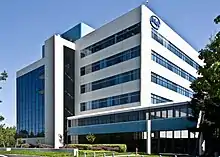
.jpg.webp)
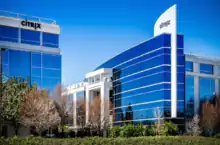
Santa Clara owns and operates an electric utility called Silicon Valley Power. In 2005 Silicon Valley Power brought online the Donald Von Raesfeld (DVR) Power Plant. The new combined cycle gas turbine plant produces 147 megawatts of electricity for the city and its residents.[19] As a result, the going rate for electricity in Santa Clara is considerably cheaper than that offered by Northern California's dominant utility, Pacific Gas and Electric.
Advanced Micro Devices (AMD), Affymetrix, Agilent Technologies, Applied Materials, Arista Networks, Aruba, Auditoria.AI, Brillio, Chegg, Cloudera, Coherent, FileMaker, Hortonworks, Infoblox, Intel, Intevac, Marvell, McAfee, Move inc, National Semiconductor, Nvidia, OmniVision, Ooyala, Palo Alto Networks, Rovi, ServiceNow, Silicon Valley Bank, Trident Microsystems and Veritas Technologies are among the companies headquartered in Santa Clara. The United States office of Namco Bandai Games is in Santa Clara.[20]
Top employers
According to the city's 2020 Comprehensive Annual Financial Report,[21] the top employers in the city are:
| # | Employer | # of Employees |
|---|---|---|
| 1 | Applied Materials | 8,500 |
| 2 | Intel | 7,801 |
| 3 | AMD | 3,000 |
| 4 | California's Great America | 2,500 |
| 5 | Avaya Inc. | 2,000 |
| 6 | Santa Clara University | 2,000 |
| 7 | City of Santa Clara | 1,973 |
| 8 | Kaiser Foundation Hospitals | 1,459 |
| 9 | Macy's | 1,200 |
| 10 | ON Semiconductor | 1,100 |
Government
.jpg.webp)
The current mayor of Santa Clara is Lisa Gillmor. Its city councilmembers are: Kathy Watanabe (District 1), Raj Chahal (District 2), Karen Hardy (District 3), Kevin Park (District 4), Suds Jain (District 5), and Anthony Becker (District 6).[3] Santa Clara is represented in California's 17th congressional district for the U.S. House of Representatives, currently represented by Ro Khanna (D).
In the California Legislature, Santa Clara is part of California's 10th State Senate district and California's 25th State Assembly district, represented in the Senate by Bob Wieckowski (D)[22] and in the Assembly by Alex Lee (D).[22]
The city operates the Santa Clara City Library, which is not part of the Santa Clara County Library District.[23]
Education
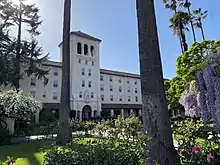
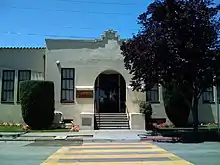
Santa Clara Unified School District is the public school district that serves Santa Clara and small portions of Sunnyvale and North San Jose. The city is home to nineteen K–8, elementary, and high schools. Many of the schools are named for former farmers, ranchers, and other notable Santa Clara residents such as Bowers and Bracher elementary schools, Buchser Middle School, Wilcox High School, Santa Clara High School, and Mission Early College High School.
A small part of the city however is served by Cupertino High School and its feeder schools in the nearby town of its namesake.
Private schools in Santa Clara include the Saint Clare School (the oldest elementary school in California) and the Granada Islamic School (Islamic school, grades K-12)[24][25]
Higher education
Colleges and universities in Santa Clara include Santa Clara University (private Jesuit university), Mission College (public community college), UC Santa Cruz Silicon Valley extension campus, and Golden State Baptist College (private Baptist college).
Culture
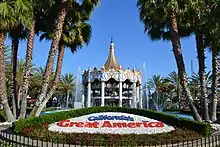
Santa Clara is also home to California's Great America, an amusement park currently operated by Cedar Fair, L.P.
Nearby is the Santa Clara Convention Center, one of Silicon Valley's largest event and meeting venues. Santa Clara also offers several museums such as the Intel Museum, Triton Museum of Art, and the Harris – Lass historical house. The Our Lady of Peace Shrine is notable for its 32-foot-tall (9.8 m) statue which is visible from Highway 101. The Mission City Center for Performing Arts is the city's venue for theatrical productions and entertainment.
Sports

The Santa Clara Broncos are the Division I NCAA athletic programs of Santa Clara University. Santa Clara sponsors 19 different teams, most of which compete in the West Coast Conference. The red and white of the Santa Clara Broncos is featured on the flag of the city, as is the Mission which lies at the heart of the campus.
The George F. Haines International Swim Center is home and host to numerous local, regional, and international competitive swimming matches.
The Santa Clara Vanguard, a competitive marching music organization, has been headquartered in Santa Clara since its inception. The organization runs and operates a winter guard, an indoor percussion ensemble, and two drum and bugle corps, all of which compete across the country every year. All four ensembles have been very successful competitively, especially the two drum corps, one of which has won 6 Open Class titles and the other 7 World Class titles. The latter is the only drum corps that has made finals every year since the beginning of Drum Corps International.
The San Francisco 49ers NFL football team has its headquarters and practice facilities in Santa Clara. On Wednesday, November 8, 2006, the 49ers announced their intention to move the team to Santa Clara in time for the fall 2014 season, after negotiations failed with the city of San Francisco to build a new stadium.[26]
Transportation
.JPG.webp)
Santa Clara has two major train stations: the Santa Clara – Great America station and the Santa Clara station. Both stations are served by Amtrak's Capitol Corridor train and the Altamont Corridor Express (ACE); the latter is also served by Caltrain.
The city is served by the VTA light rail, which operates four stations: Reamwood station, Old Ironsides station, Great America station, and Lick Mill station.
Santa Clara is located adjacent to San Jose International Airport.
Sister cities
As of May 2015, Santa Clara has three sister cities:[27]
References
- "California Cities by Incorporation Date". California Association of Local Agency Formation Commissions. Archived from the original (Word) on November 3, 2014. Retrieved August 25, 2014.
- "Government". City of Santa Clara. Retrieved April 20, 2015.
- "Councilmembers". City of Santa Clara.
- "2019 U.S. Gazetteer Files". United States Census Bureau. Retrieved July 1, 2020.
- "Santa Clara". Geographic Names Information System. United States Geological Survey, United States Department of the Interior. Retrieved November 18, 2014.
- "Santa Clara (city) QuickFacts". United States Census Bureau.
- Gannett, Henry (1902). "The Origin of Certain Place Names in the United States". Bulletin of the United States Geological Survey. U.S. Government Printing Office (197): 231. Retrieved April 24, 2014.
- "Santa Clara University Ethnobiographical Background." Santa Clara University. Retrieved on March 13, 2010.
- Santa Clara Journal microfilm, Santa Clara, California Wednesday, January 2, 1963, First (Front) page, Article: Renewal Hits Homestretch, Vol 91 No. 9, Santa Clara City Public Library Archives in Santa Clara, CA
- Santa Clara City Urban Renewal: Home Movie Clips 1963–1966 Source by Warburton, Austen; Warburton, Margot: VHS: 1 Tape of 1 Call Number: Video 979.473 S23 Case, Rights: Copyrighted. Rights are owned by Santa Clara City Library
- KPIX CBS SF Bay Area - New Movement To Rebuild Old Downtown Santa Clara
- Environmental Impact Report for the Esperanca property, Santa Clara, California, Earth Metrics Inc., California State Clearinghouse (1990)
- "Coexisting with Coyotes in Santa Clara". The Silicon Valley Voice. November 8, 2019. Retrieved December 24, 2020.
- "Santa Clara University, California – Climate Summary". Western Regional Climate Center.
- "Census of Population and Housing". Census.gov. Retrieved June 4, 2015.
- "2010 Census Interactive Population Search: CA – Santa Clara city". U.S. Census Bureau. Archived from the original on July 15, 2014. Retrieved July 12, 2014.
- "U.S. Census website". United States Census Bureau. Retrieved January 31, 2008.
- "American FactFinder – Results". U.S. Census Bureau. Archived from the original on February 12, 2020. Retrieved May 3, 2009.
- Silicon Valley Power Dedicates Donald Von Raesfeld Power Plant on June 15, 2005, City of Santa Clara news release (2005)
- "Company Info." Namco Bandai. Retrieved on December 8, 2008.
- "Comprehensive Annual Financial Report : Fiscal Year Ended June 30, 2020".
- "Statewide Database". UC Regents. Archived from the original on February 1, 2015. Retrieved November 30, 2014.
- "Library." City of Santa Clara. Retrieved on December 7, 2009.
- "Granada Islamic". California School Directory. California Department of Education. Retrieved July 24, 2018.
- "St. Clare Elementary". California School Directory. California Department of Education. Retrieved July 24, 2018.
- Cote, John; Vega, Cecilia M.; Lagos, Marisa (November 9, 2006). "Niners to leave SF, move to Santa Clara". sfgate.com. Retrieved January 29, 2020.
- "News : New Sister City". City of Santa Clara. Archived from the original on November 20, 2009. Retrieved May 1, 2015.
